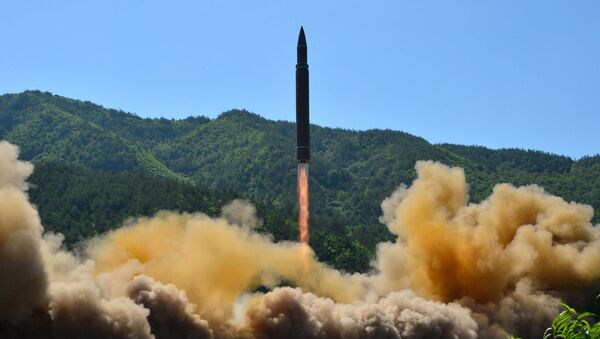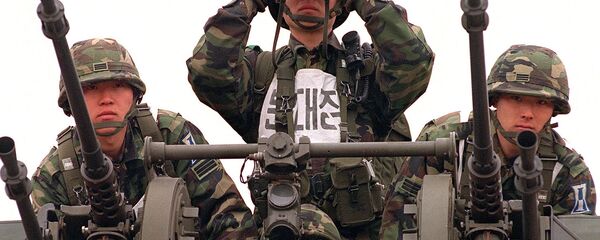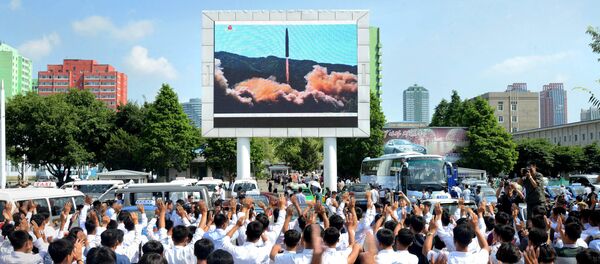South Korea is not a target
South Korea proposed to hold inter-Korean military talks on Friday, July 21, at Tongilgak, a North Korean building in the truce village of Panmunjom, the nation’s vice defense minister, Suh Choo-suk, said at a press conference in Seoul on Monday.
If the meeting is to take place as planned, it would be the first dialogue between the military authorities of the two sides in almost three years as their previous meeting was held on October 15, 2014.
Separately, South Korean authorities also offered to restart Red Cross talks on August 1, to discuss options to resume family reunions on the Chuseok holiday in early October. A previous joint event was held in October 2015 to arrange the reunion of families separated by the 1950-1953 Korean War.
Analysts told Sputnik that efforts from newly-elected South Korean President Moon Jae-in to deescalate the tension on the Korean Peninsula, amid continued missile tests from North Korea, are unlikely to persuade North Korean leader Kim Jong-un to give up his nuclear arms program, because South Korea is not the primary target or concern for the young leader in Pyongyang.
"Eventually, North Korea thinks it has to talk to the United States directly to resolve its fundamental concerns. Its sense of insecurity and the primary reason for it to develop its nuclear arms program are closely connected with the United States," Zhao Tong, a fellow in Carnegie’s Nuclear Policy Program at the Carnegie–Tsinghua Center for Global Policy in Beijing, told Sputnik.
Zhao pointed out that, while North Korea may be willing to improve its relations with South Korea, where the newly-elected Moon administration is willing to deescalate tension on the Korean Peninsula, Pyongyang is not in a rush to alter its nuclear arms program because its ultimate goal is to negotiate with the United States.
After taking office in January, US President Donald Trump has continued to push for harsher sanctions against North Korea as his primary strategy to force the young leader in Pyongyang to give up his nuclear arms program. Following his first meeting with Chinese President Xi Jinping in April, Trump said he got China onboard to enforce stricter sanctions to squeeze North Korea’s economic revenues which are believed to go into funding its nuclear programs.
North Korea continued to conduct missile tests with increased frequency. The latest test took place on July 4, when Pyongyang said it had successfully launched its first intercontinental ballistic missile (ICBM), the Hwasong-14.
The Chinese expert believes that softer stance against North Korea from the Moon administration could push Seoul in an awkward situation with the United States, which pushes for harsh sanctions.
"South Korea will definitely be in an awkward situation. If the United States continues to show no sign of compromise and no willingness to change its attitude (toward North Korea), South Korea will be in a more and more embarrassing and contradictory situation," Zhao explained.
Zhao added that it was difficult for the Moon administration to try to improve ties with both North Korea and the United States, as neither side is willing to take a step back.
Both the White House and the US State Departments have not commented on South Korea's offer to hold talks with North Korea. Katina Adams, a State Department spokesperson referred media inquiry on this issue to the South Korean government.
No clear north korea policy
Despite his frequent comments on Twitter regarding to the North Korea issue, Trump does not seem to have a clearly defined policy to defuse tension and resolve threats from Pyongyang’s nuclear arms program, experts suggested.
Robertson pointed out that, after almost more than six months in office, Trump still has not appointed a new US ambassador in Seoul.
"If you want to work together with South Korea to get things done, you need to have an ambassador there. Somebody, who is a close confidant with the (US) president, in Seoul working with the South Korean Ministry of Foreign Affairs," Robertson said.
No panic in Seoul
The Seoul-based expert explained that, despite missile tests from North Korea constantly dominated news headlines globally in recent months, local residents in the South Korean capital did not panic at all over potential threats from Pyongyang.
North Korea related stories frequently topped the most viewed stories on South Korea’s official news agency Yonhap News. But the top ten trending topics on Twitter in Korean language are mostly about South Korean celebrities.
"Nobody in Seoul really worries about it (North Korea) at all. It’s on the news, but nobody is concerned. Remember, Seoul has lived for decades with the threat of North Korean conventional artillery, which could flat the city. The ICBM doesn’t change anything," Robertson said.
It is mostly foreign students who come to study in Seoul would get a call from their parents, each time they read news about a new missile test from North Korea, the professor outlined.






